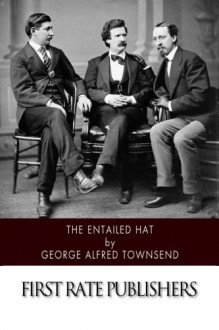Townsend was a noted American war correspondent who wrote dispatches, travelogues, and other types of historical fiction dealing with America. He was also an acquaintance of Mark Twain's. From the intro: "Once the author awoke to a painful reflection that he knew no place well, though his...
show more
Townsend was a noted American war correspondent who wrote dispatches, travelogues, and other types of historical fiction dealing with America. He was also an acquaintance of Mark Twain's. From the intro: "Once the author awoke to a painful reflection that he knew no place well, though his occupation had taken him to many, and that, after twenty-five years of describing localities and society, he would be identified with none. "Where shall I begin to rove within confines?" he asked, feeling the vacant spaces in his nature: the want of all those birds, forest trees, household habits, weeds, instincts of the brooks, and tints and tones of the local species which lie in some neighborhood's compass, and complete the pastoral mind. Numerous districts rose up and contended together, each attractive from some striking scene, or bold contrast, or lovely face; and wiser policy might have led his inclinations to one of these, redundant, perhaps, in wealth or literary appreciation; yet the heart began to turn, as in first love, or vagrancy almost as sweet, to the little, lowly region where his short childhood was lived, and where the unknown generations of his people darkened the sand—the peninsula between the Chesapeake and the Delaware. Far down this peninsula lies the old town of Snow Hill, on the border of Virginia; there the pilgrim entered the court-house, and asked to see an early book of wills, and in it he turned to the name of a maternal ancestor, of whom grand tales had been told him by an aged relative. His breath was almost taken by finding the following provisions, dated February 12, 1800: "I give and bequeath to my son, Ralph Milbourn, MY BEST HAT, TO HIM AND HIS ASSIGNEES FOREVER, and no more of my estate. "I give to Thomas Milbourn my small iron kettle, my brandy still, all my hand-irons, my pot-rack, and fifteen pounds bond that he gave to my daughter, Grace Milbourn." The next day a doctor took the author on his rounds through "the Forest," as a neighboring tract was almost too invidiously called, and through a deserted iron-furnace; village almost of the date of these wills."
show less

